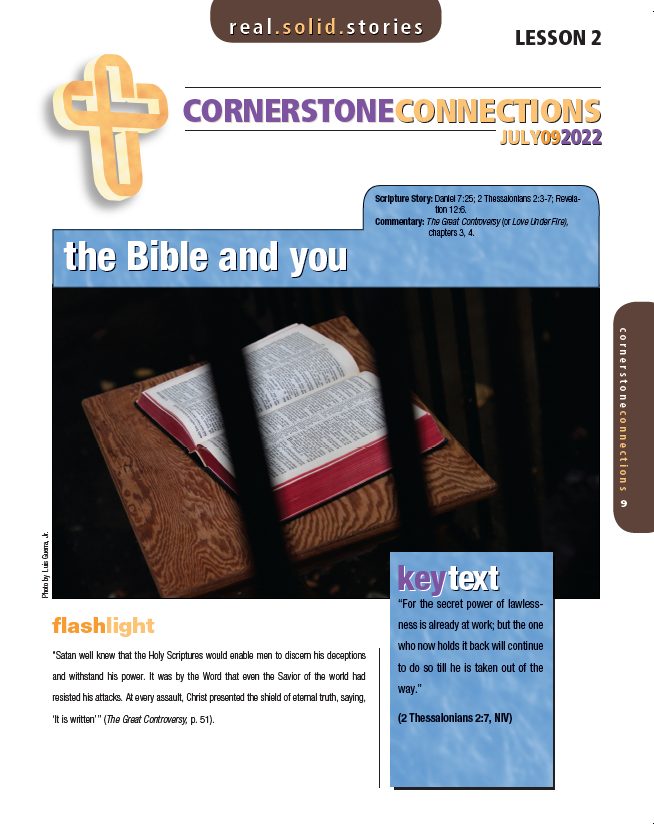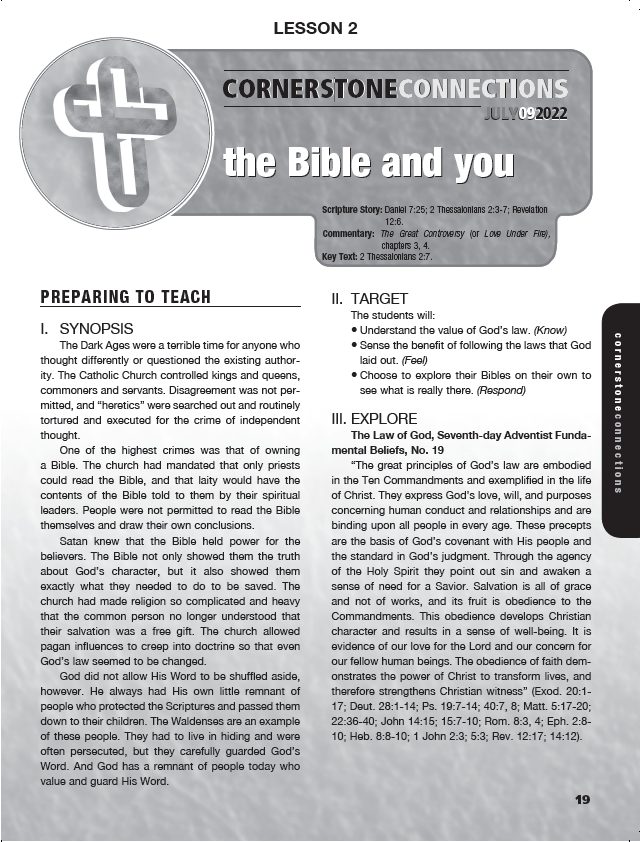Click below to download the Cornerstone Connections leader’s guide and student lesson. This week’s resources also include two lesson plans and a discussion starter video which offer different ways of looking at the topic. Each lesson plan includes opening activities, scripture passages, discussion questions, and real-life applications.
Daniel 7:25
2 Thessalonians 2:3-7
Revelation 12:6
Love Under Fire - Ch. 3
Spiritual Darkness in the Early Church

Love Under Fire - Ch. 4
The Waldenses Defend the Faith

One of the greatest crimes during the Dark Ages was that of owning a Bible. But God had a remnant then—and now—who value and guard His Word.
SCRIPTURE PASSAGES
OVERVIEW
Around the world, 26.4 million people have had to flee their homes.[1] Can you imagine what it would be like to leave everything behind except a few belongings that could be quickly stuffed in a bag or suitcase? How would it feel to not know where you’re going to live or what’s happened to the home you left behind? It’s unsettling to think about these kinds of things, but for many it’s not a hypothetical situation. Wars, famines, weather events, and many other things have caused people to have to abandon where they live and go looking for a better place. Being a Christian, one knows that this world is not our home and that there are forces attempting to disrupt our lives and cause us to doubt the one who made us. Our lesson today is about understanding that this world is not our home and that God will ultimately rescue His people from this conflict – the Great Controversy.

OPENING ACTIVITY: GARAGE SALE AD
QUESTIONS
TRANSITION
Democracy versus dictatorship. Good versus evil. God versus Satan. Each of these represent a conflict in which people have had to choose a side. Sometimes it’s an easy choice with obvious villains and heroes. Other times, the progression is subtle and choices are made almost subconsciously. Grab your Bible and let’s look at some examples of how choices impacted people’s lives.

BIBLE STUDY GUIDE
Read 1 Kings 3:16-28.
3 Now there were four men with leprosy at the entrance of the city gate. They said to each other, “Why stay here until we die? 4 If we say, ‘We’ll go into the city’—the famine is there, and we will die. And if we stay here, we will die. So let’s go over to the camp of the Arameans and surrender. If they spare us, we live; if they kill us, then we die.”
5 At dusk they got up and went to the camp of the Arameans. When they reached the edge of the camp, no one was there, 6 for the Lord had caused the Arameans to hear the sound of chariots and horses and a great army, so that they said to one another, “Look, the king of Israel has hired the Hittite and Egyptian kings to attack us!” 7 So they got up and fled in the dusk and abandoned their tents and their horses and donkeys. They left the camp as it was and ran for their lives.
8 The men who had leprosy reached the edge of the camp, entered one of the tents and ate and drank. Then they took silver, gold and clothes, and went off and hid them. They returned and entered another tent and took some things from it and hid them also.
9 Then they said to each other, “What we’re doing is not right. This is a day of good news and we are keeping it to ourselves. If we wait until daylight, punishment will overtake us. Let’s go at once and report this to the royal palace.”
10 So they went and called out to the city gatekeepers and told them, “We went into the Aramean camp and no one was there—not a sound of anyone—only tethered horses and donkeys, and the tents left just as they were.” 11 The gatekeepers shouted the news, and it was reported within the palace.
12 The king got up in the night and said to his officers, “I will tell you what the Arameans have done to us. They know we are starving; so they have left the camp to hide in the countryside, thinking, ‘They will surely come out, and then we will take them alive and get into the city.’ ”
13 One of his officers answered, “Have some men take five of the horses that are left in the city. Their plight will be like that of all the Israelites left here—yes, they will only be like all these Israelites who are doomed. So let us send them to find out what happened.”
14 So they selected two chariots with their horses, and the king sent them after the Aramean army. He commanded the drivers, “Go and find out what has happened.” 15 They followed them as far as the Jordan, and they found the whole road strewn with the clothing and equipment the Arameans had thrown away in their headlong flight. So the messengers returned and reported to the king. 16 Then the people went out and plundered the camp of the Arameans. So a seah of the finest flour sold for a shekel, and two seahs of barley sold for a shekel, as the Lord had said.
17 Now the king had put the officer on whose arm he leaned in charge of the gate, and the people trampled him in the gateway, and he died, just as the man of God had foretold when the king came down to his house. 18 It happened as the man of God had said to the king: “About this time tomorrow, a seah of the finest flour will sell for a shekel and two seahs of barley for a shekel at the gate of Samaria.”
19 The officer had said to the man of God, “Look, even if the Lord should open the floodgates of the heavens, could this happen?” The man of God had replied, “You will see it with your own eyes, but you will not eat any of it!” 20 And that is exactly what happened to him, for the people trampled him in the gateway, and he died.
QUESTIONS
Read 2 Kings 7:3-20.
3 Now there were four men with leprosy at the entrance of the city gate. They said to each other, “Why stay here until we die? 4 If we say, ‘We’ll go into the city’—the famine is there, and we will die. And if we stay here, we will die. So let’s go over to the camp of the Arameans and surrender. If they spare us, we live; if they kill us, then we die.”
5 At dusk they got up and went to the camp of the Arameans. When they reached the edge of the camp, no one was there, 6 for the Lord had caused the Arameans to hear the sound of chariots and horses and a great army, so that they said to one another, “Look, the king of Israel has hired the Hittite and Egyptian kings to attack us!” 7 So they got up and fled in the dusk and abandoned their tents and their horses and donkeys. They left the camp as it was and ran for their lives.
8 The men who had leprosy reached the edge of the camp, entered one of the tents and ate and drank. Then they took silver, gold and clothes, and went off and hid them. They returned and entered another tent and took some things from it and hid them also.
9 Then they said to each other, “What we’re doing is not right. This is a day of good news and we are keeping it to ourselves. If we wait until daylight, punishment will overtake us. Let’s go at once and report this to the royal palace.”
10 So they went and called out to the city gatekeepers and told them, “We went into the Aramean camp and no one was there—not a sound of anyone—only tethered horses and donkeys, and the tents left just as they were.” 11 The gatekeepers shouted the news, and it was reported within the palace.
12 The king got up in the night and said to his officers, “I will tell you what the Arameans have done to us. They know we are starving; so they have left the camp to hide in the countryside, thinking, ‘They will surely come out, and then we will take them alive and get into the city.’ ”
13 One of his officers answered, “Have some men take five of the horses that are left in the city. Their plight will be like that of all the Israelites left here—yes, they will only be like all these Israelites who are doomed. So let us send them to find out what happened.”
14 So they selected two chariots with their horses, and the king sent them after the Aramean army. He commanded the drivers, “Go and find out what has happened.” 15 They followed them as far as the Jordan, and they found the whole road strewn with the clothing and equipment the Arameans had thrown away in their headlong flight. So the messengers returned and reported to the king. 16 Then the people went out and plundered the camp of the Arameans. So a seah of the finest flour sold for a shekel, and two seahs of barley sold for a shekel, as the Lord had said.
17 Now the king had put the officer on whose arm he leaned in charge of the gate, and the people trampled him in the gateway, and he died, just as the man of God had foretold when the king came down to his house. 18 It happened as the man of God had said to the king: “About this time tomorrow, a seah of the finest flour will sell for a shekel and two seahs of barley for a shekel at the gate of Samaria.”
19 The officer had said to the man of God, “Look, even if the Lord should open the floodgates of the heavens, could this happen?” The man of God had replied, “You will see it with your own eyes, but you will not eat any of it!” 20 And that is exactly what happened to him, for the people trampled him in the gateway, and he died.
QUESTIONS
Read Daniel 7:25.
25 He will speak against the Most High and oppress his holy people and try to change the set times and the laws. The holy people will be delivered into his hands for a time, times and half a time.
Read 2 Thessalonians 2:3-7.
3 Don’t let anyone deceive you in any way, for that day will not come until the rebellion occurs and the man of lawlessness is revealed, the man doomed to destruction. 4 He will oppose and will exalt himself over everything that is called God or is worshiped, so that he sets himself up in God’s temple, proclaiming himself to be God.
5 Don’t you remember that when I was with you I used to tell you these things? 6 And now you know what is holding him back, so that he may be revealed at the proper time. 7 For the secret power of lawlessness is already at work; but the one who now holds it back will continue to do so till he is taken out of the way.
QUESTIONS
Read Revelation 12:6.
1A great sign appeared in heaven: a woman clothed with the sun, with the moon under her feet and a crown of twelve stars on her head. 2 She was pregnant and cried out in pain as she was about to give birth. 3 Then another sign appeared in heaven: an enormous red dragon with seven heads and ten horns and seven crowns on its heads. 4 Its tail swept a third of the stars out of the sky and flung them to the earth. The dragon stood in front of the woman who was about to give birth, so that it might devour her child the moment he was born. 5 She gave birth to a son, a male child, who “will rule all the nations with an iron scepter.” And her child was snatched up to God and to his throne. 6 The woman fled into the wilderness to a place prepared for her by God, where she might be taken care of for 1,260 days.
QUESTIONS

APPLICATION
The Bible is full of examples of how God has taken care of His people. God never leaves His people uncared for and unprotected. The help He provides often comes from unexpected places like lepers who find and empty an army camp, a young girl who becomes queen, twelve disciples who follow Jesus and helped change the world, and you—what’s going to be your contribution? Scripture tells us that our lives aren’t always going to follow the fairytale motif where everything is amazing, but it does tell us that those who are faithful will have the happily ever after ending that they want because God has already won the war and is about to come and take His children—refugees from sin—home to heaven.
FOLLOW UP
Use www.biblegateway.com or Google to look up some examples in scripture where God rescues His people. Make a list of these passages and share your findings with a friend, sibling, or parent. Remember that God’s big enough to handle the problem of sin and take care of you—at the same time.

SCRIPTURE PASSAGE
OVERVIEW
Throughout history, God has communicated. According to Psalm 19:1-4, the heavens declare God’s glory day and night, and this message goes throughout the earth. Paul picked up this theme in Romans 1:19-20, extending it through all forms of creation. In fact, Paul said there’s no excuse for not knowing God based simply on the created works of God and how God instills a knowledge of Himself in everyone.
The Bible records messages God sent to specific people. Much of this relates not only to the ones who first received these messages, but they continue to speak to us today. In Amos 3:5, God said He sends messages before His actions. Those who hear from God and communicate the messages are called “prophets.” This simply means they pass along the message God gave them.
Our passage for today includes a similar message in the New Testament. Peter’s second letter in the Bible, 2 Peter, includes Peter’s claim that the Bible contains supernatural messages God sent to people through the Holy Spirit (see 2 Peter 1:20-21).
Before printing presses, accessing a Bible or even just a small part of the Bible was difficult. People memorized whatever parts of the Bible they could find. Without a Bible, just about anyone could claim to have their own message from God. But the Bible contains what others have found to be truly messages from God.
Most young people in North America today have easy access to the Bible on their devices. Some Bible apps have lots of different English translations right at your fingertips. And yet with such easy access, so few actually read God’s messages which are so readily available! When multiple English translations broadened the possibilities of reading different versions, fewer people memorized Scripture, so fewer have Bible verses etched into their minds for reflection. A verse like Psalm 119:11 (NKJV), “Your word I have hidden in my heart that I might not sin against You,” might not be practiced much today.
Today’s lesson is about the importance of Scripture. When Bibles are scarce, people tend to value them more. Our challenge in North America today is to read and take to heart the Bible that is so readily accessible to us.
A Word From God
What’s a good way for God to get your attention?
Read 2 Peter 1:1-21.
Simon Peter, a servant and apostle of Jesus Christ, To those who through the righteousness of our God and Savior Jesus Christ have received a faith as precious as ours: 2 Grace and peace be yours in abundance through the knowledge of God and of Jesus our Lord.
Confirming One’s Calling and Election
3 His divine power has given us everything we need for a godly life through our knowledge of him who called us by his own glory and goodness. 4 Through these he has given us his very great and precious promises, so that through them you may participate in the divine nature, having escaped the corruption in the world caused by evil desires.
5 For this very reason, make every effort to add to your faith goodness; and to goodness, knowledge; 6 and to knowledge, self-control; and to self-control, perseverance; and to perseverance, godliness; 7 and to godliness, mutual affection; and to mutual affection, love. 8 For if you possess these qualities in increasing measure, they will keep you from being ineffective and unproductive in your knowledge of our Lord Jesus Christ. 9 But whoever does not have them is nearsighted and blind, forgetting that they have been cleansed from their past sins.
10 Therefore, my brothers and sisters, make every effort to confirm your calling and election. For if you do these things, you will never stumble, 11 and you will receive a rich welcome into the eternal kingdom of our Lord and Savior Jesus Christ.
Prophecy of Scripture
12 So I will always remind you of these things, even though you know them and are firmly established in the truth you now have. 13 I think it is right to refresh your memory as long as I live in the tent of this body, 14 because I know that I will soon put it aside, as our Lord Jesus Christ has made clear to me. 15 And I will make every effort to see that after my departure you will always be able to remember these things.
16 For we did not follow cleverly devised stories when we told you about the coming of our Lord Jesus Christ in power, but we were eyewitnesses of his majesty. 17 He received honor and glory from God the Father when the voice came to him from the Majestic Glory, saying, “This is my Son, whom I love; with him I am well pleased.” 18 We ourselves heard this voice that came from heaven when we were with him on the sacred mountain.
19 We also have the prophetic message as something completely reliable, and you will do well to pay attention to it, as to a light shining in a dark place, until the day dawns and the morning star rises in your hearts. 20 Above all, you must understand that no prophecy of Scripture came about by the prophet’s own interpretation of things. 21 For prophecy never had its origin in the human will, but prophets, though human, spoke from God as they were carried along by the Holy Spirit.
1. What qualified Peter to write this letter?
2. What is the main purpose of Peter’s letter (and the whole Bible)?
3. Which promises from God do you go to most often?
4. Where/When have you experienced God's divine power?
5. Why do people fail to develop Godly virtues?
6. How can you be certain a message comes from God?
7. Peter referred to Christ’s dramatic transfiguration (vs. 16-18; see also Mark 9:1-10). What have you experienced so far in your life that makes you certain Jesus is real, and that Jesus is God?
8. For you, when has the Bible been like a light shining in a dark place (vs. 19)?
SUMMARY
Peter had a message for followers of Christ in his day. The Holy Spirit inspired him to write these words. He also drew upon his experiences with the supernatural to verify the divine infusion of God’s messages to us. That same Holy Spirit remains active today as we read the messages in 2 Peter and in the rest of the Bible. We have 66 books of divinely inspired messages plus the presence of the Holy Spirit in and around us today. What is God’s word to you for today?

APPLICATION
Tapping into God’s messages in Scripture, here are a few application ideas for the youth to put into practice this week as they listen to “a word from God.”
If you Google “Bible promises,” you’ll find quite an assortment easily available. Some claim the Bible has more than 3,000 promises, while others extend that number to 8,800+. Don’t be overwhelmed; revel in God’s abundance!
Sometimes it’s good to read just one verse from God’s word and let that stay with you. Another option is to read through an entire portion of Scripture, like an entire story. Try that by reading an entire book of the Bible! The book of Jonah is only about two or three pages long (four chapters). While some parts are familiar to most Christians, some parts aren’t (or we’ve forgotten them).
Question #7 in the RBS asked what you have experienced so far in your life that makes you certain Jesus is real, and that Jesus is God. We could adapt that question for your application to: When/Where have you heard a word from God?




